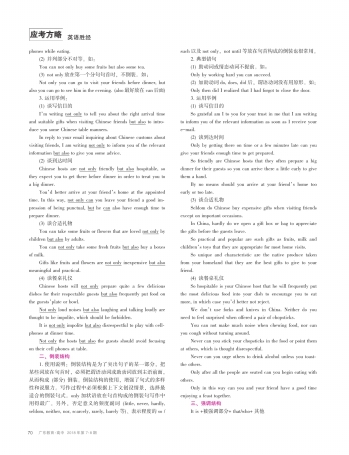(2)并列部分不对等。如:
You can not only buy some fruits but also some tea.
(3)not only放在第一个分句句首时,不倒装。如:
Not only you can go to visit your friends before dinner, but also you can go to see him in the evening.(also最好放在 can后面)
3. 运用举例:
(1)谈写信目的
I’m writing not only to tell you about the right arrival time and suitable gifts when visiting Chinese friends but also to introduce you some Chinese table manners.
In reply to your email inquiring about Chinese customs about visiting friends, I am writing not only to inform you of the relevant information but also to give you some advice.
(2)谈到达时间
Chinese hosts are not only friendly but also hospitable, so they expect you to get there before dinner in order to treat you to a big dinner.
You’d better arrive at your friend’s home at the appointed time. In this way, not only can you leave your friend a good impression of being punctual, but he can also have enough time to prepare dinner.
(3)谈合适礼物
You can take some fruits or flowers that are loved not only by children but also by adults.
You can not only take some fresh fruits but also buy a boxes of milk.
Gifts like fruits and flowers are not only inexpensive but also meaningful and practical.
(4)谈餐桌礼仪
Chinese hosts will not only prepare quite a few delicious dishes for their respectable guests but also frequently put food on the guests’plate or bowl.
Not only loud noises but also laughing and talking loudly are thought to be impolite, which should be forbidden.
It is not only impolite but also disrespectful to play with cellphones at dinner time.
Not only the hosts but also the guests should avoid focusing on their cell phones at table.
二、倒装结构
1. 使用说明:倒装结构是为了突出句子的某一部分,把某些词放在句首时,必须把谓语动词或助动词放到主语前面,从而构成(部分)倒装。倒装结构的使用,增强了句式的多样性和说服力。写作过程中必须根据上下文创设情景,选择最适合的倒装句式。only加状语放在句首构成的倒装句写作中用得最广。另外,否定意义的频度副词(little, never, hardly, seldom, neither, nor, scarcely, rarely, barely等)、表示程度的so /such以及not only,not until等放在句首构成的倒装也很常用。
2. 典型错句
(1)助动词或情态动词不提前。如:
Only by working hard you can succeed.
(2)加助动词do, does, did后,谓语动词没有用原形。如:
Only then did I realized that I had forgot to close the door.
3. 运用举例
(1)谈写信目的
So grateful am I to you for your trust in me that I am writing to inform you of the relevant information as soon as I receive your e-mail.
(2)谈到达时间
Only by getting there on time or a few minutes late can you give your friends enough time to get prepared.
So friendly are Chinese hosts that they often prepare a big dinner for their guests so you can arrive there a little early to give them a hand.
By no means should you arrive at your friend’s home too early or too late.
(3)谈合适礼物
Seldom do Chinese buy expensive gifts when visiting friends except on important occasions.
In China, hardly do we open a gift box or bag to appreciate the gifts before the guests leave.
So practical and popular are such gifts as fruits, milk and children’s toys that they are appropriate for most home visits.
So unique and characteristic are the native produce taken from your homeland that they are the best gifts to give to your friend.
(4)谈餐桌礼仪
So hospitable is your Chinese host that he will frequently put the most delicious food into your dish to encourage you to eat more, in which case you’d better not reject.
We don’t use forks and knives in China. Neither do you need to feel surprised when offered a pair of chopsticks.
You can not make much noise when chewing food, nor can you cough without turning around.
Never can you stick your chopsticks in the food or point them at others, which is thought disrespectful.
Never can you urge others to drink alcohol unless you toastthe others.
Only after all the people are seated can you begin eating with others.
Only in this way can you and your friend have a good time enjoying a feast together.
三、强调结构
It is +被强调部分+ that/who+ 其他


